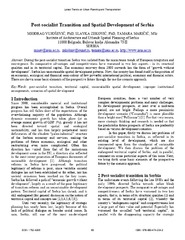Приказ основних података о документу
Post-socialist Transition and Spatial Development of Serbia
| dc.creator | Vujošević, Miodrag | |
| dc.creator | Zeković, Slavka | |
| dc.creator | Maričić, Tamara | |
| dc.date.accessioned | 2018-12-26T10:56:27Z | |
| dc.date.available | 2018-12-26T10:56:27Z | |
| dc.date.issued | 2010 | |
| dc.identifier.isbn | 978-960-474-204-2 | |
| dc.identifier.issn | 1792-4286 | |
| dc.identifier.uri | https://raumplan.iaus.ac.rs/handle/123456789/175 | |
| dc.description.abstract | During the post-socialist transition Serbia was isolated from the mainstream trends of European integration and convergence. Its comparative advantages and competitiveness have worsened in two key aspects - in its structural qualities and in its territorial capital. The economic recovery from 2000 onwards has the form of "growth without development". Serbia has unsustainable spatial development patterns. Now, the country has found itself in the position of an economic, ecological and financial semi-colony of few powerful international political, economic and financial actors. There are shown some basic elements of the prospective future through the use the scenario approach. | en |
| dc.publisher | World Scientific And Engineering Acad And Soc, Athens | |
| dc.rights | openAccess | |
| dc.source | Latest Trends on Urban Planning and Transportation | |
| dc.subject | post-socialist transition | en |
| dc.subject | territorial capital | en |
| dc.subject | unsustainable spatial development | en |
| dc.subject | improper institutional arrangements | en |
| dc.subject | scenarios of spatial development | en |
| dc.title | Post-socialist Transition and Spatial Development of Serbia | en |
| dc.type | conferenceObject | |
| dc.rights.license | ARR | |
| dcterms.abstract | Зековић, Славка; Вујошевић, Миодраг; Маричић, Тамара; | |
| dc.citation.spage | 60 | |
| dc.citation.epage | 65 | |
| dc.citation.other | pp. 60-65 | |
| dc.identifier.wos | 000301093100011 | |
| dc.identifier.scopus | 2-s2.0-79958743313 | |
| dc.identifier.fulltext | https://raumplan.iaus.ac.rs//bitstream/id/851/UPT-07.pdf | |
| dc.identifier.rcub | https://hdl.handle.net/21.15107/rcub_raumplan_175 | |
| dc.type.version | publishedVersion |

